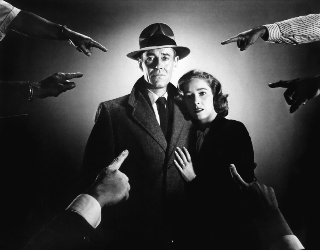Essential Cinema: The Wrong Man
By Steven Pate in Arts & Entertainment on Jul 20, 2010 8:30PM

Henry Fonda and Vera Miles star in Alfred Hitchcock's The Wrong Man
There's a possibly-apocryphal biographical tidbit, often repeated by the auteur himself, wherein the 5-year-old Alfred was sent to the police station with a note from his father, then promptly locked in a cell by the receiving police officer, who said "This is what we do to naughty boys." The sentence turned out to be only ten minutes, but surely it could not have seemed longer to the boy, and he never forgot the sound of that cell door clanging unjustly shut.
The Wrong Man finds Hitch delivering the same sadistic lesson to us, his audience, using Hollywood's most likable and sympathetic actor as our stand-in. Henry Fonda plays Manny Balestrero, a down-on-his-luck bass player and family man mistakenly identified as a serial thief. Through a series of coincidences and the nightmarish, impersonal bureaucracy of justice, the evidence of his guilt appears to mount, as does our poor proxy's anguish and his wife's distress. The villain turns out to be the system, which holds the lives of this middle class family in its indifferent jaws, ready to devour or to release them with little regard for truth.
Hitchcock came across the story in a Life magazine article and rendered it more or less faithfully, with The Wrong Man ending up as his only work attempting what he described as an "unmistakably documentary" style. He went so far as to have several of the victims and police officers portray themselves in the film and to prominently employ many of the actual locations. Hitchcock chose to return to black and white in a deliberate attempt to impart a gritty seriousness to the subject. There is both the heavy hand of late 40s noir and the reverence for actuality of Italian Neorealism (it's as if Robert Wise directed A Man Escaped), but the Hitchcockian lust for suspense, like the haunting Bernard Hermann score, hangs unmistakably over each frame. A truly overlooked classic.
Catch The Wrong Man at Doc films this Friday at 7:00 p.m. and 9:30 p.m.